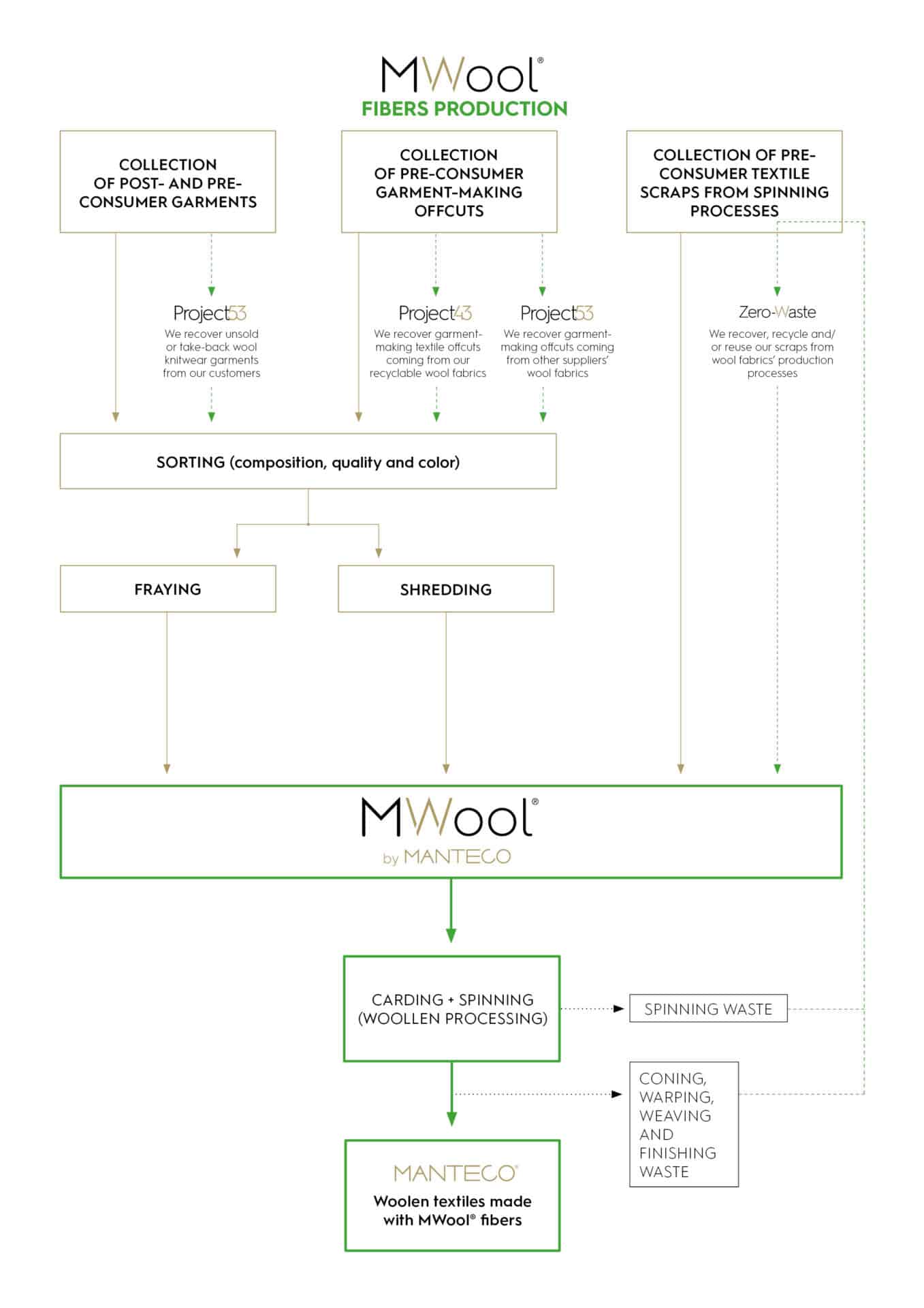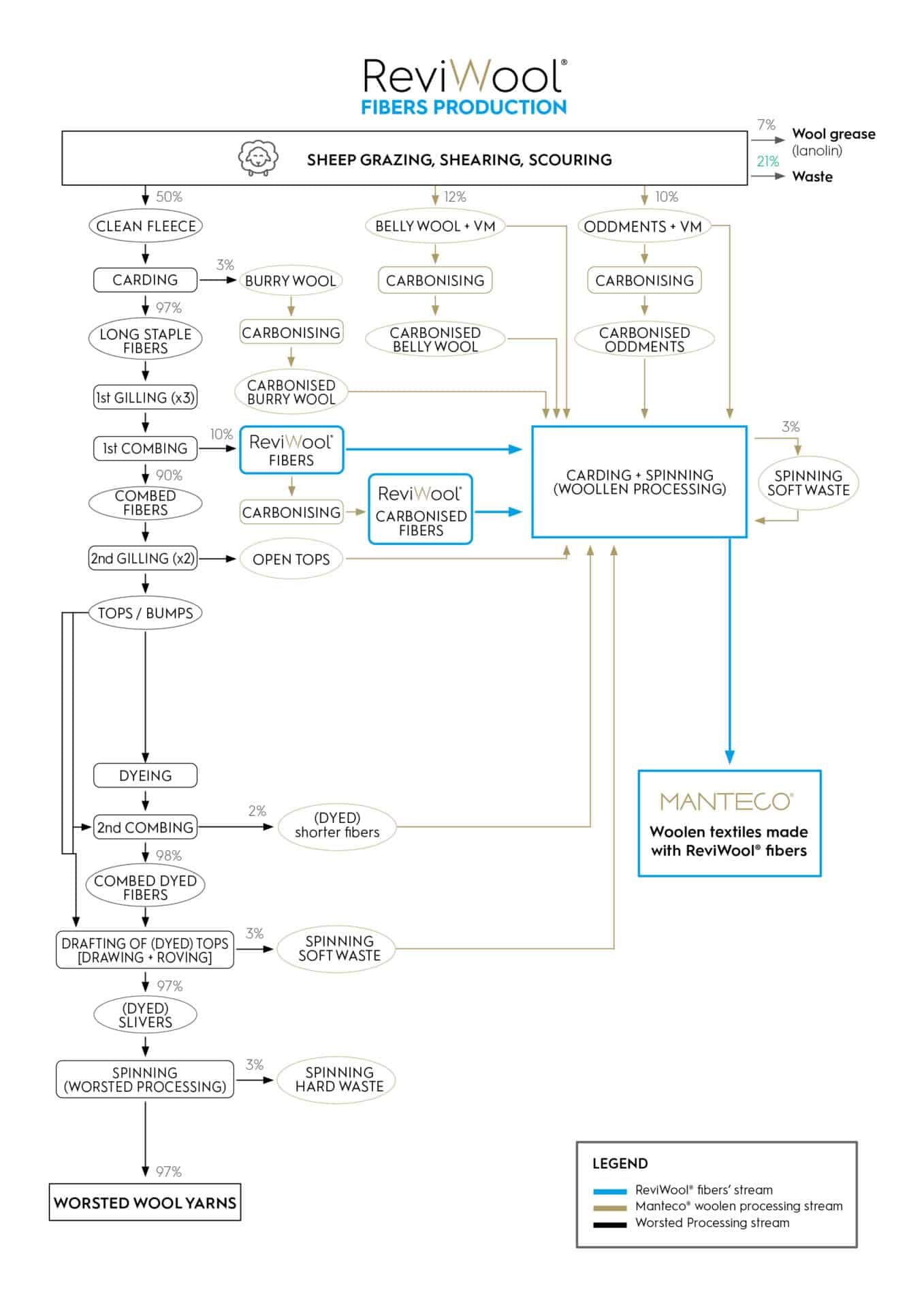Life Cycle Assessments & EPD®
All our products, projects and strategies derive from a signature science-based philosophy and approach
We have always believed that there are no positive products, circular economy practices and sustainability strategies without a scientific mapping and measurement of our raw materials and manufacturing processes. Manteco® has been carrying out Life Cycle Assessments for years, since when it still was a pioneering thing in the industry, in order to quantify our products’ environmental impacts, finding the areas for achieving improvements and accellerate the transition to science-based choices and designs. All of this has allowed us to run unprecedented studies, make scientific publications and create our own brands of sustainable wool: MWool®, the next generation of recycled wool, and ReviWool®, the low impact virgin wool.
Manteco® has run the first-ever Life Cycle Assessment on recycled wool fibers and comparison with generic virgin wool fibers

After years of assessments and in-depth studies, we managed to achieve a certified Life Cycle Assessment calculation for our MWool® fibers. Our study, in collaboration with the prestigious Politenico di Torino, develops an environmental analysis of recycled wool fibers through the Life Cycle Assessment methodology. A parallel LCA is developed for virgin wool fibers too, in order to obtain a data-based comparison. Deep analyses have been carried out to capture the uncertainty associated with virgin fibers’ impacts and to evaluate how MWool® impacts vary according to the origin and treatment of recycled textiles. Results show that recycled wool fibers have significantly lower environmental impacts than virgin fibers, even when the most unfavorable scenarios are considered. MWool®, compared to generic virgin wool fibers, impacts 99,2% less on climate change, 99,9% less on water use and 93,3% less on total energy consumption.
This study was also peer-reviewed, published as a scientific article on MPDI Resources and also certified according to the international EPD® Environmental Product Declaration standard.
Our Life Cycle Assessment on MWool® fibers

MWool® yarns' low impacts were also calculated and certified according to the international EPD® scheme
EPD® is a certified Environmental Product Declaration, which trasparently reports environmental data over the life cycle of products in accordance with the international standard ISO 14025. MWool® yarns are the first-ever recycled wool yarns to obtain this certification.
Our EPD® - Environmental Product Declaration on MWool® yarns
Our EPD® - Environmental Product Declaration on MWool® Blend Fabrics
Our EPD® - Environmental Product Declaration on our patented Pure® Fabrics, made of 100% MWool®
Our EPD® - Environmental Product Declaration on our patented Woolten® Fabrics, made of MWool® and Lenzing TENCEL™ Lyocell
Our EPD® - Environmental Product Declaration on our Noble fabrics, made of MWool® and cashmere
Manteco® has run the first-ever Life Cycle Assessment that maps and assesses ALL wool materials’ impacts

Our Life Cycle Assessment on ReviWool® fibers

ReviWool® fabrics' low impacts were also calculated and certified according to the international EPD® scheme
An EPD® is a certified Environmental Product Declaration, which trasparently reports environmental data over the life cycle of products in accordance with the international standard ISO 14025. ReviWool® fabrics’ EPD® is available here.
Our EPD® - Environmental Product Declaration on ReviWool® Blend fabrics
Our EPD® - Environmental Product Declaration on Noble Fabrics, made of ReviWool® fibers and cashmere
Sign up for Manteco updates
Type your e-mail address and stay up to date on Manteco news, events and initiatives

